新高一英语教师辅导讲义
第高一英语精品讲义(人教2019)(教师版)

20 单元复习与提升1 分层单词写作词汇1. soul n.灵魂;心灵2. opportunity n.机会;时机3. onto prep.(朝)向4. ordinary adj.普通的;平凡的5. prove vt.证明;展现6. award vt.授予n.奖品7. stage n.(发展或进展的)时期;阶段;(多指剧场中的)舞台8. altogether adv.(用以强调)全部;总共9. thus adv.如此;因此10. band n.乐队;带子11. nowadays adv.现在;目前12. cure vt.治愈;治好(疾病);解决(问题)n.药物;治疗;(解决问题、改善糟糕情况的)措施13. impact n.巨大影响;强大作用;冲击力14. disease n.(疾)病15. moreover adv.而且;此外16. being n.身心;存在;生物17. various adj.各种不同的;各种各样的阅读词汇1. classical adj.古典的;经典的2. hip-hop n.嘻哈音乐;嘻哈文化3. virtual adj.很接近的;事实上的;虚拟的4. studio n.演播室;(音乐的)录音棚;工作室5. phenomenon n.现象6. rap n.快速敲击;说唱音乐vi.& vt.敲击;(说唱歌中的)念白7. romantic adj.浪漫的n.浪漫的人8. album n.相册;集邮簿;音乐专辑9. repetition n.重复;重做10. somehow adv.以某种方式(或方法);不知怎么地11. outline n.& vt.概述;概要拓展词汇1. energy n.能源;能量;精力→energetic adj.充满活力的;精力充沛的;积极的→energetically adv.精力充沛地,积极地2. composition n.成分;(音乐、艺术、诗歌的)作品→composer n.作曲者;作曲家→compose v.作曲;创作(音乐)3. perform vi.& vt.表演;履行;执行→performance n.表演;演技;表现→performer n.表演者;演员4. enable vt.使能够;使可能→able adj.能;能够→ability n.能力→disable vt.使伤残;使丧失能力→disability n.残疾;缺陷→unable adj.不能做到的;无法5. original adj.原来的;独创的;原作的n.原件;原作→originally adv.原来;起初→origin n.起源;源头;出身;身世6. gradual adj.逐渐的;渐进的→gradually adv.逐渐地;逐步地7. capable adj.有能力的;有才能的→capability n.能力;才能→incapable adj.无能力的8. relief n.(焦虑、痛苦的)减轻或消除;(不快过后的)宽慰、轻松或解脱→relieve v.解除,减轻,缓和(不快或痛苦)→relieved adj.感到宽慰的;放心的9. previous adj.先前的;以往的→previously adv.先前地10. unemployed adj.失业的;待业的→employ vt.雇用;利用(时间、精力等)→employee n.雇工,雇员→employer n.雇主,老板→employment n.雇用;职业;就业11. aim n.目的;目标vi.& vt.力求达到;力争做到;瞄准vt.目的是;旨在→aimless adj.没有方向的;无目标的;无计划的→aimlessly adv.漫无目的地;无目标地12. equipmen t n.设备;装备→equip vt.装备;配备;使有所准备13. talent n.天才;天资;天赋→talented adj.有才能的;有才干的14. piano n.钢琴→pianist n.钢琴弹奏者;钢琴家15. assume vt.以为;假设→assuming conj.假设……为真;假如16. addition n.添加;加法;增加物→additional adj.附加的;额外的;外加的→add v.增加;添加17. treatment n.治疗;对待;处理→treat vt.治疗;对待;款待n.款待;招待18. satisfaction n.满足;满意;欣慰→satisfy v.使满意;使满足;满足(要求、需要等)→satisfied adj.(人感到)满意的;满足的→satisfying adj.令人满意(或满足)的19. personification n.拟人;人格化;化身→person n.人;个人20. reaction n.反应;回应→react vi.作出反应;回应;起化学/过敏反应2 高频短语1. fall in love with爱上2. absorbed in sth./sb.被……吸引住;专心致志3. set sth. up安装好(设备或机器)4. try out参加……选拔(或试演)5. in addition (to sb./sth.)除……以外(还)6. at all根本,究竟7. from (then)on从(那)时起8. get through(设法)处理;完成9. on one’s own独自;单独;独立地10. do with处理;与……有关11. turn out结果证明,原来是12. pay off付清;偿清3 经典句型1. Imagine having the opportunity to sing(想象一下有机会去演唱)together with hundreds of other people while you are at home alone. (祈使句)2. When questioned(当被质疑时)by the media, they are not discouraged and practise even harder.(when+过去分词)3. Two years ago, I was told I had a serious disease which was difficult to cure(难以治愈). (主语+be+adj.+不定式)4. During those times, music can help you in the same way that it helped me(用它帮助我的相同方式). (the way 作先行词)【话题重现】Mary, one of my best friends, now falls in love with 1.____________(classic)music because it is good for the soul and enables her to be full of energy. It can even help her go 2. ____________many ups and downs in her life.Wanting to further develop her music skills, she is eager 3. ____________(set)up a studio or form a music band. Several days ago, she 4. ____________(occasional)found an opportunity to sing together with hundreds of other people. Through the virtual choir she showed her talent for music. Mary performed so well 5. ____________ one club offered her a part-time job.Mary’s uncle is a composer and conductor. Once he gave Mary a chance to take part in a singing contest. She performed so well that she 6. ____________(award)first prize. How 7. ____________(excite)she was! Nowadays Mary has many fans and her ordinary life 8. ____________(change)a lot. But she doesn’t think it is 9.______ good phenomenon. Now, although she is capable of 10. ____________(sing)various kinds of songs, she still thinks that school comes first.Mary’s experience shows that music has a very positive impact on us. It not only can help one live a colourful life, but also can make a person become rich and famous.答案:1. classical2. through3. to set4. occasionally5. that6. was awarded7. excited8. has changed9. a10. singing【主题词汇】分层提分基础过关一、用所给单词的适当形式填空1.The government has an interest in importing scientific ___________(equip).2.Her being questioned by the police received an immediate ______ (react) from the local people.3.Do take advantage of this opportunity _____ (deepen) your understanding of Chinese culture.4._____ (original), we had intended to go to Italy, but then we won the trip to Spain.5._____ (assume) you are right, we'll make a great deal of money from the project.答案:3.to deepen4. Originally解析:句意为:我们本来打算去意大利,但后来赢得了去西班牙旅行的机会。
高中英语必修一培优精品讲义
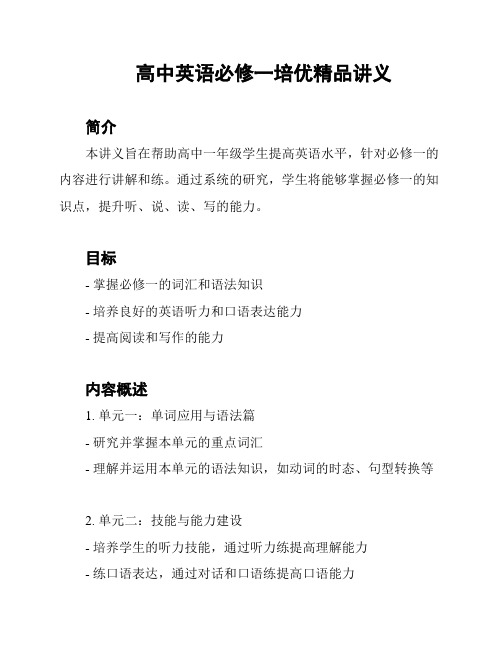
高中英语必修一培优精品讲义
简介
本讲义旨在帮助高中一年级学生提高英语水平,针对必修一的内容进行讲解和练。
通过系统的研究,学生将能够掌握必修一的知识点,提升听、说、读、写的能力。
目标
- 掌握必修一的词汇和语法知识
- 培养良好的英语听力和口语表达能力
- 提高阅读和写作的能力
内容概述
1. 单元一:单词应用与语法篇
- 研究并掌握本单元的重点词汇
- 理解并运用本单元的语法知识,如动词的时态、句型转换等
2. 单元二:技能与能力建设
- 培养学生的听力技能,通过听力练提高理解能力
- 练口语表达,通过对话和口语练提高口语能力
3. 单元三:阅读与写作训练
- 阅读课文,并进行相关的理解和练
- 提供写作指导,帮助学生提升写作能力
研究方法
- 提供课程讲义,包含课文、词汇、语法和练题
- 学生可根据讲义自主研究,按照教师安排的时间进行研究
- 配套联系册提供自测和巩固练
效果评估
- 定期进行听力、口语、阅读和写作的测试,评估学生的研究成果和能力提升情况
- 结合学生的表现和反馈,及时调整教学方法和内容,促进学生的进步
注意事项
- 学生应按时完成作业和练题,主动参与课堂讨论和练
- 学生要保持英语研究的积极态度,养成良好的研究惯和方法
希望本讲义能够帮助学生打好高中英语的基础,更好地应对研究和考试的挑战。
高一英语上 (Unit2 .Care for hair 语法:句子成分的学习--B)教师辅导讲义教案
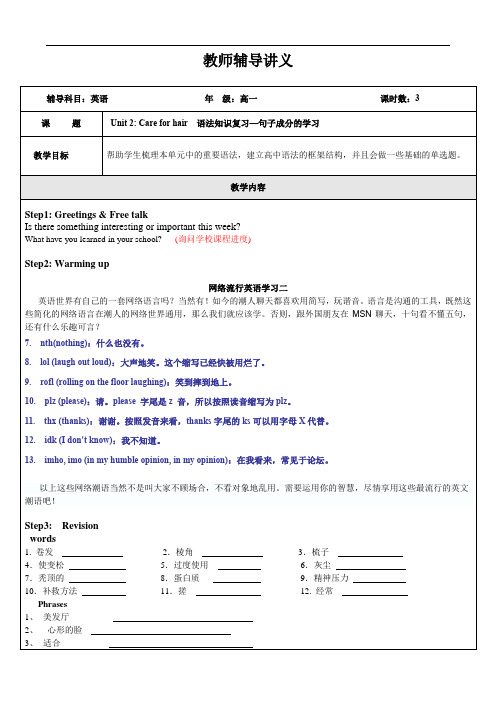
③You must paygoodattentiontoyourpronunciation.
A B C D
④How many newwordsdidyoulearnlast class?
A B C D
⑤Some of thestudentsin the school wantto go swimming,howaboutyou?A BC D
(二)选出句中谓语的中心词
①I don't like the picture on the wall.
A. don't B. like C. picture D. wall
②The days get longer and longer when summer comes.
A. get B. longer C. days D. summer
③Do you usually go to school by bus?
A. Do B. usually C.go D. bus
④There will be a meeting at the library this afternoon.
A. will be B. meeting C. the library D. afternoon
A B C D
*****************************************************************************************************
4.宾语:1)动作的承受者-----动宾
I like China.(名词)He hates you.(代词)
How many do you need? We need two.(数词)We should help the old and the poor.
高一英语下 (Unit2. Great minds基础知识梳理)教师辅导讲义教案

教师辅导讲义(2 )have (no) idea短语,意思为“(不)知道;无能为力”,后面可以带of或about引导的介词短语,也可跟从句,但接that引导的从句时,of往往省略,而接wh-引导的从句,of可以保留也可省略。
-Have you got any idea (of) why he said so? 你知道他为什么这么说吗?-I've got no idea of/about it at all.我根本不知道。
I have no idea (of) whether he will come today.我不知道他今天是否来。
6. They left the university, with Einstein drivingwith +n. /pron. +doing/done为介词短语,在句中起伴随状语的作用。
doing或done是分词结构作介词with后名词或代词的宾语补足语,doing表主动关系,done表被动关系。
With no one talking to him, the child soon fell asleep.因为无人跟他说话,孩子不久就睡着了。
The boy was thinking about something, with his head rested in his hand.男孩用手托着头在思考问题。
活学活用:With a lot of difficult problems ,the newly-elected president is having a hard time.A. settledB. settlingC. to settleD. being settled答案:C7. ...that even my driver knows how to answer it.“what/when/where/which/who/whether/how+不定式”可以用来描述行为,这个结构在句子中可充当主语、表语或宾语。
新高一衔接班英语讲义

1.语音攻略:大胆读出来出错越多进步越大2. 单词攻略a.单词的重要性:b.记哪些单词:3.语法攻略:从句4.阅读攻略:5.写作攻略:6.听力攻略:第二-三课时一、语法精讲第一讲对句子的认识零、基础知识还原1.十大词类名词----------表示人或事物的名称形容词-------表示人或事物的特征副词----------修饰动词、形容词、或其他副词动词----------表示动作或状态代词----------代替名词、数词数词----------表示数量或顺序冠词----------限制名词的意义介词-------表示名词、代词和其他词的关系连词-------连接词与词或句与句感叹词-----表示说话时的感情或语气一、按句子的结构可分三种:1)简单句:只有一个主语(或并列主语)和一个谓语(或并列谓语)。
e.g. He often reads English in the morning.Tom and Mike are American boys.2) 并列句:由并列连词(and, but, or等)或分号(;)把两个或两个以上的简单句连在一起构成。
e.g. You help him and he helps you.The future is bright; the road is tortuous. 前途是光明的,道路是曲折的。
3)复合句:含有一个或一个以上从句的句子。
复合句包含:名词性从句(主语从句、宾语从句、表语从句和同位语从句)、定语从句和状语从句等。
e.g. The foreign visitors took a lot of pictures when they were at the Great Wall.二、简单句的五种类型4.give, offer, teach, tell, read, ask,bring, pass, lend, return, write, throw, allow,send,cost make, buy, do, get,save, cook, sing, find等。
高一英语讲义(预科)
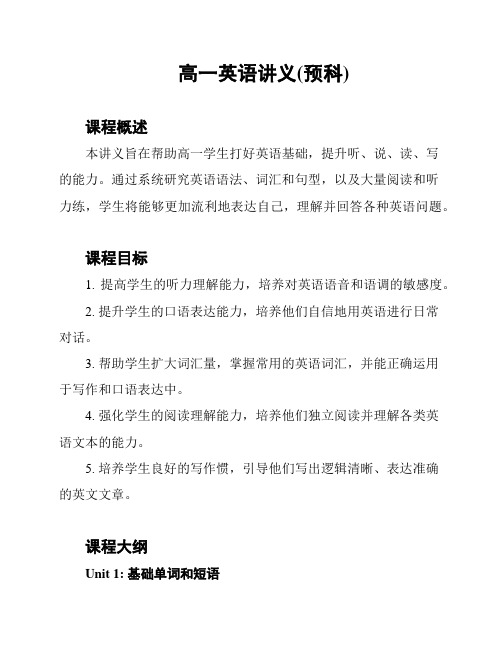
高一英语讲义(预科)课程概述本讲义旨在帮助高一学生打好英语基础,提升听、说、读、写的能力。
通过系统研究英语语法、词汇和句型,以及大量阅读和听力练,学生将能够更加流利地表达自己,理解并回答各种英语问题。
课程目标1. 提高学生的听力理解能力,培养对英语语音和语调的敏感度。
2. 提升学生的口语表达能力,培养他们自信地用英语进行日常对话。
3. 帮助学生扩大词汇量,掌握常用的英语词汇,并能正确运用于写作和口语表达中。
4. 强化学生的阅读理解能力,培养他们独立阅读并理解各类英语文本的能力。
5. 培养学生良好的写作惯,引导他们写出逻辑清晰、表达准确的英文文章。
课程大纲Unit 1: 基础单词和短语- 掌握100个常用英语单词和短语,了解其用法和搭配。
- 运用这些单词和短语进行基础的句子构建和对话练。
Unit 2: 语法基础- 理解并研究英语的基本语法规则,包括时态、语态、名词、代词、形容词、副词等。
- 运用所学语法知识进行简单的句子分析和构建。
Unit 3: 听力训练- 听取各类英语录音材料,理解并获取关键信息。
- 完成听力练,提高听力理解能力并培养听力技巧。
Unit 4: 口语表达- 研究常用的口语表达方式,如问候、介绍、询问和回答问题等。
- 进行口语练,提高口语流利度和语感。
Unit 5: 阅读理解- 阅读各类英语文章,包括新闻报道、故事、科普文章等。
- 理解文章内容,回答相关问题,提高阅读理解能力。
Unit 6: 写作技巧- 研究写作的基本要素,如文章结构、段落组织、句子连接等。
- 进行写作练,培养写作惯和写作技巧。
参考资料- 《高中英语教程》- 《高中英语综合教程》- 在线英语研究网站和应用程序- 英语辅导练书籍和题集以上是《高一英语讲义(预科)》的简要概述,我们将通过系统学习和练习,帮助学生逐步提高英语能力,为将来更深入的英语学习打下坚实的基础。
最新新高一英语教师辅导讲义
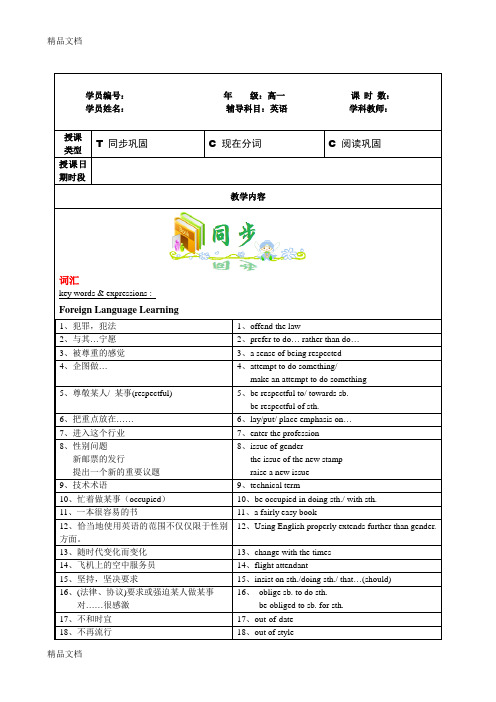
学员编号:年级:高一课时数:学员姓名:辅导科目:英语学科教师:授课类型T同步巩固 C 现在分词 C 阅读巩固授课日期时段教学内容词汇key words & expressions :Foreign Language Learning1、犯罪,犯法1、offend the law2、与其…宁愿2、prefer to do… rather than do…3、被尊重的感觉3、a sense of being respected4、企图做…4、attempt to do something/make an attempt to do something5、尊敬某人/ 某事(respectful) 5、be respectful to/ towards sb.be respectful of sth.6、把重点放在……6、lay/put/ place emphasis on…7、进入这个行业7、enter the profession8、性别问题新邮票的发行提出一个新的重要议题8、issue of genderthe issue of the new stampraise a new issue9、技术术语9、technical term10、忙着做某事(occupied)10、be occupied in doing sth./ with sth.11、一本很容易的书11、a fairly easy book12、恰当地使用英语的范围不仅仅限于性别方面。
12、Using English properly extends further than gender.13、随时代变化而变化13、change with the times14、飞机上的空中服务员14、flight attendant15、坚持,坚决要求15、insist on sth./doing sth./ that…(should)16、(法律、协议)要求或强迫某人做某事对……很感激16、oblige sb. to do sth.be obliged to sb. for sth.17、不和时宜17、out-of-date18、不再流行18、out of style现在分词学习非谓语动词包括动词不定式、动名词、动词现在分词和过去分词四种。
高一英语必修一复习讲义(教师版)

高一英语复习讲义 B1U1一.重点单词1._amaze__vt.使惊奇;使惊诧→__amazing__ adj.令人大为惊奇的,令人惊喜的→_amazed__ adj.大为惊讶的→ ___amazement___ n.惊讶;惊奇2. __advance_ n.进步,进展;前进,行进 vt.&vi.发展→ __advanced__ adj.高级的,先进的→_advancement_ n.发展3._acquire_vt.获得,得到→_acquired_ adj.已获得的→_acquisition_n.取得4._challenge _→vt.&n.挑战;质疑_challenging_ adj.具有挑战性的5._equal_adj.相等的;平等的;相当的vt.比得上(be ~ to) (反 unequal)→_equally_ adv.同样地;平等地;另外→_equality_ n.平等;相等(反 inequality)6._independent_ adj.自主的,有主见的;自立的(be ~ of不依赖)→_independence_ n.独立;自主→_independently_ adv独立地;自主地7._responsible_adj.有责任的,负责;可靠的(反 irresponsible)→_responsibility_ n.责任;义务8._propose_vt.提议,求婚→_proposal_ n提议,建议,动议9._alarm _ n闹钟;恐慌vt.使惊恐→_alarmed_ adj.惊恐的→_alarming_ adj.使人惊恐的10. _contribute__ v. 捐献; 贡献→ _contribution_ n. 贡献;捐款;捐赠→_contributor__ n.捐献者;投稿人11._fortune _ n. 运气, 财富 (反 misfortune)→_fortunate_ adj.幸运的(反 unfortunate)→_fortunately_ adv.幸运地(反 unfortunately)12._option_ n.可选择的事物,选择;选修课→_optional__ adj.可选择的(反 pulsory courses必修课)13._attract__ vt.吸引;招引;引起(反应)→ _attractive_ adj.吸引人的→ _attraction_n.有吸引力的事物二.重点短语1.迫不及待做某事can’t wait to do2.最后但同样重要的last but not least3.努力做某事make efforts to do4.对…负责be responsible for5.有机会做某事have an opportunity to do6.同等重要的 be of equally importance7.对…有信心be confident of/about= have confidence in8.起作用,有影响make a difference to9.独立于,不依靠be independent of10.利用take advantage of= make use of11.坚持,固守stick to12.积极参与take an active part in13.集中精力,关注于focus/concentrate on14.提醒某人某事remind sb of sth(使某人回忆起)15.以…为基础be based on16.作为…的交换in exchange for17.别无选择只能做…have no choice/option but to do18. lead to 导致,通向19. lie in 在于,位于20. rise to the challenge 奋力迎接挑战21. make a difference to 起作用,有影响22. most importantly 最重要的是23. as a result of 由于,因为24. a time of learning and discovery 学习和发现的时期25. put simply 简言之26. in the years ahead 在未来的几年三.单词拼写(根据首字母或汉语提示完成句子)1. As a _potential_(有潜力的) candidate, you are supposed to find approaches to achievingyourselves.2. We must make the most efficient use of the available financial _resources_ (资源).3. Take advantage of your classes, learn from your teachers and classmates, and make use of our school _facilities__(设施).4. His p roposal_____ (建议) that the system should be changed was rejected.5. It will help you bee more patient and _focused___.(目标明确的)6. _Fortunately_(幸运地), Pakistan didn't have to fight alone against the COVID19 pandemic, with China extending a helping hand.7. Experience is what mattersage is of _secondary_ (次要的) importance.8. What he did at the party seemed to be contrary to his _character__ (性格).9. A mazingly___, the trees grow in such a way that their leaves and branches, although close together, never touch one another.10. It was reported that the doctor had acted r esponsibly_.11. I chose it as a gift to show my appreciation and as a r eminder__ of my unforgettable timehere with you.12. We examined the wording in d etail__ before deciding on the final text.13. He promised to help us and he s tuck__ to his words.14. There is no point e xchanging_ a pletely physical job for a holiday full of physical activity.15. We will make greater c ontributions__ to world peace and development.16. They are so a ttractive_ that they attract millions of tourists from all over the world everyyear.17. The rainforest in Brazil is reducing at an a larming_ rate.18. B ased_ on the above, I hope more and more students will join in this activity.高一英语复习讲义 B1U2一.重点单词1. roof n.屋顶,顶部 _roofs__(pl.)2. argue vi.争吵,争辩,争论 _argument_ n.3. anger n. 怒气,怒火 __angry_ adj. 愤怒的,生气的;4. desire n.&vt.渴望,希望_desired_ adj.希望实现的,期望得到的 _desirable_ adj. 令人向往的,值得拥有的5. regular adj. 频繁的;有规律的 _regularly_ adv. 定期的,有规律的;频繁的_irregular_ adj.无规律的,不定期的;不平整的,不整齐的;不正常的6. concern n.担心;关心 vt.涉及;让(某人)担忧 _concerned_ adj.相关的(be ~ with);担心的,焦急的(be ~ about);关注的,感兴趣的 _concerning_; prep. 关于,涉及7. normal n.通常标准adj.正常的,一般的_abnormal_ adj.反常的8. stress n.精神压力,紧张;强调 vt.强调,着重_stressed_ adj.焦虑的,紧张的 ;重读的_stressful_ adj.紧张的,压力大的9. skin n.皮肤;(兽)皮,皮毛 _skinny_ adj. 皮包骨的,极瘦的10. likely adj. 可能的,有希望的 _unlikely_ adj. 不太可能的,没希望的11. performance n.表现;表演;执行_perform_ vt. & vi. 表演;执行;运转 _performer__ n.表演者12. eager adj. 热切的, 渴望的, 渴求的 _eagerly__ adv. 急切地;渴望地 __eagerness__ n. 渴望,热心13. adventure n. 冒险, 冒险经历, 奇遇 _adventurer__ n.冒险家 _adventurous_ adj. 有冒险精神的,大胆开拓的14. flexible adj.灵活的,可变动的;柔韧的 _flexibly__ adv.灵活地_flexibility_ n.灵活性15. secure adj. 安心的;可靠的;牢固的(v.获得) _insecure_ adj.不安全的 _securely_ adv. 安全地 _security__ n.安全16. graduate vi.&vt. 毕业 n.毕业生 __graduation_ n. 毕业n.毕业;毕业典礼17. volunteer vi.&vt.主动建议(或告诉);自选做,义务做(~ to do 自愿做) n.志愿者_voluntary_ adj.自愿的,自发的;志愿的,义务性的二.教材语块梳理1.(在某事上)与某人看法一致see eye to eye with sb on sth2.快速长高,蹿个儿shoot up (过去式shot, 过去分词 shot)3.平静,镇静,安静calm down4.从某人的角度、观点出发from one’s point of view5.充分考虑,全盘考虑,想透think through6.承认错误,认输 back down7.(使)变得高兴,振奋起来cheer up8. 缠磨,烦扰be on one’s back about sth9.清点,不把…算在内count out10.提取,支取draw sth out of sth11.火爆的争吵和冰冷的沉默heated arguments and cold silences12.经历一个快速发展的时期go through a period of rapid development13.导致这样紧张的家庭关系result in such family tensions14.担心某事 be anxious/concerned about= show one’s concern for15.身心健康physical and mental health16.渴望独立have a desire for independence17.维持和平的关键the key to keeping/maintaining peace18.结果是/最后都会好转turn out to be fine19.…做某事是可能的It’s likely that…20.做某事是没有意义的。
高一英语培优班讲义
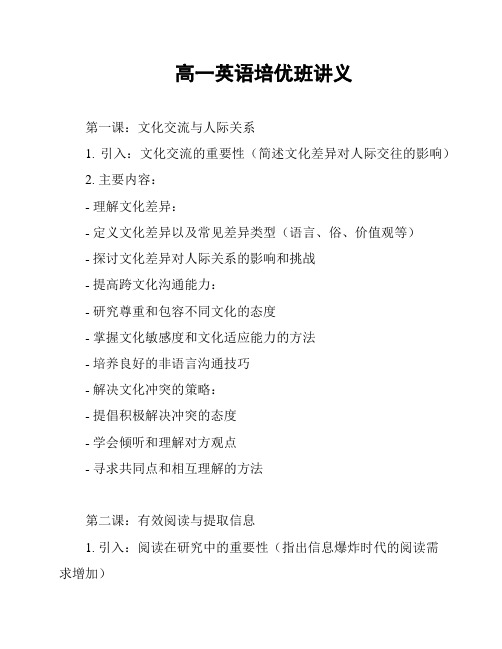
高一英语培优班讲义第一课:文化交流与人际关系1. 引入:文化交流的重要性(简述文化差异对人际交往的影响)2. 主要内容:- 理解文化差异:- 定义文化差异以及常见差异类型(语言、俗、价值观等)- 探讨文化差异对人际关系的影响和挑战- 提高跨文化沟通能力:- 研究尊重和包容不同文化的态度- 掌握文化敏感度和文化适应能力的方法- 培养良好的非语言沟通技巧- 解决文化冲突的策略:- 提倡积极解决冲突的态度- 学会倾听和理解对方观点- 寻求共同点和相互理解的方法第二课:有效阅读与提取信息1. 引入:阅读在研究中的重要性(指出信息爆炸时代的阅读需求增加)2. 主要内容:- 提高阅读速度与理解力:- 研究快速阅读的技巧和方法- 培养良好的阅读惯和注意力集中力- 提取信息的技巧:- 研究如何预测和推测文章内容- 学会根据上下文理解生词和短语的意思- 使用标记和注释方法整理和记录重要信息- 掌握主旨大意的归纳和概括能力第三课:写作技巧与学术规范1. 引入:写作在研究和工作中的重要性(指出写作能力是高一研究的核心能力)2. 主要内容:- 写作要素和结构:- 介绍写作的基本要素(主题句、支持句、结论句等)- 研究不同文章类型的写作结构和特点- 提高写作表达能力:- 研究如何清晰、准确地表达观点和论证- 培养合理组织文章的能力- 提升语法和词汇水平以及修辞技巧- 学术规范和引用技巧:- 介绍学术规范和引用的重要性- 研究不同引用格式的使用方法- 强调必须遵守学术诚信和文献知识产权的原则第四课:口语表达与演讲技巧1. 引入:口语表达和演讲技巧在人际交往和职场中的价值(指出提高口语表达能力的必要性)2. 主要内容:- 提高口语流利度:- 研究正确发音和语调的方法- 锻炼口语表达的自信和流畅度- 演讲技巧与实践:- 研究演讲准备和呈现的步骤- 锻炼演讲的姿势、语速和声音控制- 掌握观众互动和演讲稿的编写技巧第五课:听力技巧与理解力培养1. 引入:听力能力在英语研究中的重要性(强调听力对整体语言能力的促进作用)2. 主要内容:- 提高听力技巧:- 研究如何快速捕捉听力材料的关键信息- 提升听力理解不同语速和口音的能力- 培养听力理解力:- 研究预测和推理听力材料的内容- 积极参与听力训练和实践以上是高一英语培优班的讲义大纲,希望同学们能够通过这些课程内容提高英语综合能力,为高中学习打下坚实的基础。
高一英语下 (Unit5. Problems and advice 基础知识梳理)教师辅导讲义教案
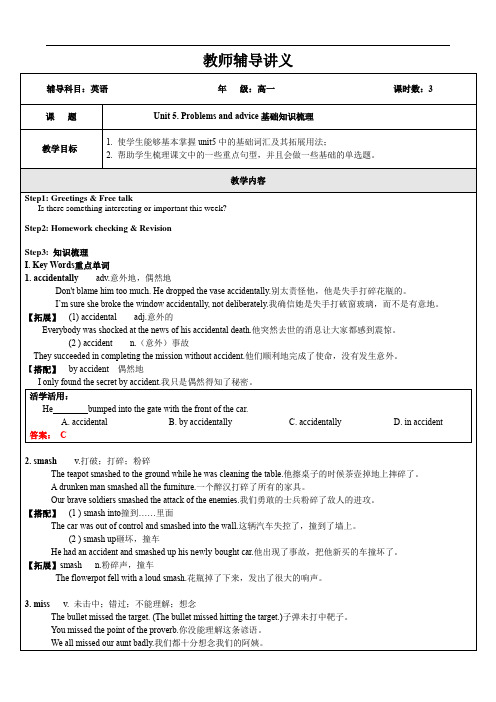
教师辅导讲义12. violence n. 暴力The police are determined to stop violence in the streets.警察决定制止街上的暴力。
Many TV viewers were shocked at the violence and bad language in the film.影片中的暴力场面和难听的粗话使许多电视观众感到震惊。
【拓展】violent adj.强烈的;凶暴的e. g. a violent wind暴风 a violent attack猛攻 a violent toothache剧烈的牙痛13. purchase n. 购买的东西The couple were proud of their new purchase—a house in the country.这对夫妇非常满意新近在乡下买的一栋房子。
This shirt was the most extravagant purchase I have ever made.这件衬衫是我买过的最奢侈的东西。
【拓展】purchase n.购买The young couple work very hard to save money to purchase a new flat.这对年轻夫妇努力工作为了存钱买一套新公寓。
14. grumble v.咕哝;发牢骚They always find something to grumble about.他们总是怨这怨那。
【搭配】grumble at / about / over sthHe grumbled at/about/over the low pay offered to him.他抱怨给他的待遇低。
Why grumble at me about your own stupid mistakes? 干嘛向我抱怨你自己犯的愚蠢错误?【拓展】grumble n.怨言,牢骚He is a person full of grumbles.他是个牢骚满腹的人。
高一英语湘教版精讲学习资料

高一英语湘教版精讲学习资料英语是一门重要的国际语言,学好英语对于我们来说非常重要。
在高一的学习中,我们将开始学习湘教版的英语教材。
为了更好地掌握课堂内容,我为大家准备了一份精讲学习资料,希望能给大家提供帮助。
1. Listening SkillsListening skills are crucial in language learning. Here are some tips to improve your listening skills:1) Practice listening to different accents: English is spoken by people from all over the world, and each region has its own accent. By listening to a variety of accents, you can train your ears to understand different pronunciations.2) Listen to a variety of materials: Apart from listening to audio recordings from your textbook, try listening to songs, podcasts, and movies in English. This will expose you to different styles of speech and vocabulary.3) Take notes while listening: Note down the main points or keywords while listening. This will help you remember the information better and assist in comprehension.2. Reading ComprehensionReading comprehension is an essential skill for understanding written texts. To improve your reading comprehension, you can follow these strategies:1) Skim the text: Before diving into a passage, quickly read through it to get a general idea of the topic and main points. This will help you understand the context better.2) Use context clues: When you encounter unfamiliar words, try to guess their meanings based on the surrounding words or sentences. This will help you understand the overall meaning of the passage.3) Practice active reading: Engage actively with the text by highlighting key points, underlining important information, or making notes in the margins. This will help you stay focused and improve your understanding.3. Speaking PracticePracticing speaking is crucial for improving your oral English. Here are some ways you can practice speaking:1) Find language partners: Look for someone to practice speaking English with, such as a classmate or a language exchange partner. You can have conversations on various topics and help each other improve.2) Record yourself speaking: Use your smartphone or a recording device to record yourself speaking in English. Listen to the recording and analyze your pronunciation and fluency. This self-evaluation will help you identify areas for improvement.3) Join speaking clubs or activities: Participate in speaking clubs or activities in your school or community. This will provide you with opportunities to practice speaking in a supportive and interactive environment.4. Writing SkillsDeveloping good writing skills is crucial for expressing your thoughts and ideas effectively in English. Here are some tips to improve your writing skills:1) Read extensively: Reading enables you to grasp different writing styles, sentence structures, and vocabulary. Aim to read a variety of materials, such as newspapers, books, and online articles.2) Expand your vocabulary: Learn new words and phrases and try to incorporate them into your writing. This will make your writing more diverse and engaging.3) Practice writing regularly: Set aside time to write every day, even if it's just a short paragraph or a diary entry. Regular practice will help you develop your writing skills and build confidence.In conclusion, mastering English requires consistent practice and effort. By improving your listening, reading, speaking, and writing skills, you will be better equipped to excel in your high school English studies. Use the provided tips and strategies to enhance your learning experience, and remember, practice makes perfect!。
领航教育高中英语必修1讲义(教师版)

Module 1 My First Day at Senior HighI. 教学内容分析作为高中英语的开始,通过本模块的学习将对学生今后英语学习产生重要的影响。
本模块是介绍一位高中新生第一天到学校观察和接触到的人和事物以及个人的感受,内容紧密结合学生现实生活。
教学中应尽量激发学生的兴趣,使学生尽快适应高中的学习。
Introduction部分通过几个问题让学生学习有关课程的英语名称,让学生初步了解高中阶段的学习内容,并让学生就自己喜欢的学科展开讨论,消除学生对新环境的陌生,积极表达自己的意见看法,营造良好的学习氛围。
Reading and Vocabulary部分是本模块的主要内容,文章主要是一名高中学生以日记的形式比较了初、高中学校的异同,描写了高中英语课的教学,引导学生热爱现有的班集体。
通过阅读,学习相关的生词,让学生对教师、班级、学生以及学校等情况英语表达有个一个初步接触和了解;要求学生通过阅读,初步了解以-ing和-ed结尾的形容词在句子中的作用。
Grammar 1部分通过复习一般现在时的用法,使学生熟练掌握该时态的正确形式,然后再和现在进行时的比较,使学生深化对两种时态含义的理解,从而提高写句子的能力。
Listening and Vocabulary部分学习生词及其构词法(学习动词、名词和形容词的后缀及三者之间的相互转换),并为听力活动以及今后学习打下词汇基础,通过听力活动巩固所学词汇并加以运用。
Grammar 2部分学习-ing和-ed结尾的形容词,并通过相关的练习学会如何正确使用这两种形式的形容词。
Pronunciation部分学习-ed结尾的单词的发音,掌握三种词尾后加-ed的发音规则。
Speaking部分通过三副美国校园生活的图片来引起学生的兴趣,回答模块提出的问题,对美国学校进行相关的描述,并与中国学校进行比较,提出自己的看法。
Writing部分通过阅读一名美国中学生写的电子邮件,并通过回答问题的方式,培养学生基本的造句能力,为写一封关于自己学校的回信作准备。
高一英语语法全讲义精讲

高一英语语法讲义一、句子成分及简单句五种基本句型一、句子成分(一)句子成分的定义:构成句子的各个部分叫做句子成分。
句子成分有主要成分和次要成分;主要成分有主语和谓语;次要成分有表语、宾语、定语、状语、补足语和同位语。
(二)主语:主语是一个句子所叙述的主体,一般位于句首。
但在there be结构、疑问句(当主语不是疑问词时)和倒装句中,主语位于谓语、助动词或情态动词后面。
主语可由名词、代词、数词、不定式、动名词、名词化的形容词和主语从句等表示。
例如:During the 1990s, American country music has become mo re and more popular.(名词)We often speak English in class.(代词)One-third of the students in this class are girls.(数词)、To swim in the river is a great pleasure.(不定式)Sm oking does harm to the health.(动名词)The ri ch should help the poor.(名词化的形容词)When we are going to have an English test has not been decided.(主语从句)It is necessary to master a foreign language.(it作形式主语,真正的主语为后面的不定式)(三)谓语:谓语说明主语所做的动作或具有的特征和状态。
动词在句中作谓语,一般放在主语之后。
谓语的构成如下:1、简单谓语:由一个动词或动词短语构成。
如:He practices running every morning.2、复合谓语:(1)由情态动词或其他助动词加动词原形构成。
如:You may keep the book for two weeks. He has caught a bad cold. (2)由系动词加表语构成。
高一英语辅导讲义
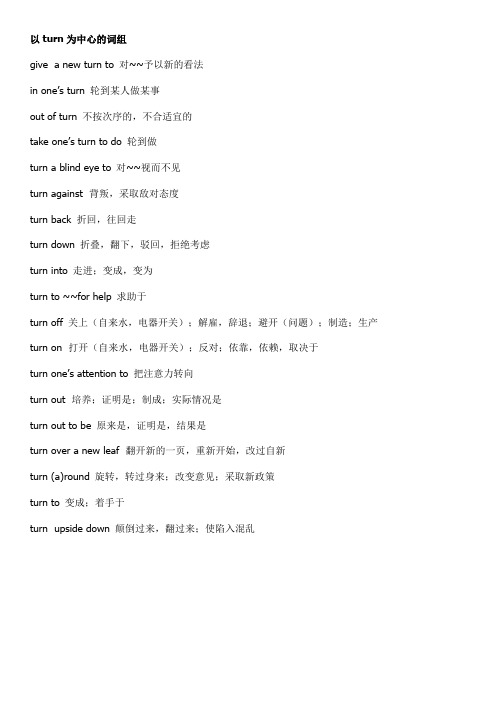
以turn为中心的词组give a new turn to 对~~予以新的看法in one’s turn 轮到某人做某事out of turn 不按次序的,不合适宜的take one’s turn to do 轮到做turn a blind eye to 对~~视而不见turn against 背叛,采取敌对态度turn back 折回,往回走turn down 折叠,翻下,驳回,拒绝考虑turn into 走进;变成,变为turn to ~~for help 求助于turn off 关上(自来水,电器开关);解雇,辞退;避开(问题);制造;生产turn on 打开(自来水,电器开关);反对;依靠,依赖,取决于turn one’s attention to 把注意力转向turn out 培养;证明是;制成;实际情况是turn out to be 原来是,证明是,结果是turn over a new leaf 翻开新的一页,重新开始,改过自新turn (a)round 旋转,转过身来;改变意见;采取新政策turn to 变成;着手于turn upside down 颠倒过来,翻过来;使陷入混乱AEarly one morning, more than a hundred years ago, an American inventor called Elias Howe finally fell asleep. He had been working all night on the design of a sewing machine but he had run into a very difficult problem: It seemed impossible to get the thread to run smoothly around the needle.Though he was tired, Howe slept badly. He turned and turned. Then he had a dream. He dreamt that he had been caught by terrible savages whose king wanted to kill him and eat him unless he could build a perfect sewing machine. When he tried to do so, Howe ran into the same problem as before. The thread kept getting caught around the needle. The king flew into the cage and ordered his soldiers to kill Howe. They came up towards him with their spears raised. But suddenly the inventor noticed something. There was a hole in the tip of each spear. The inventor awoke from the dream, realizing that he had just found the answer to the problem. Instead of trying to get the thread to run around the needle, he should make it run through a small hole in the center of the needle. This was the simple idea that finally made Howe design and build the first really practised sewing machine. Elias Howe was not the only one in finding the answer to his problem in this way.Thomas Edison, the inventor of the electric light, said his best ideas came into him in dreams. So did the great physicist Albert Einstein. Charlotte Bronte also drew in her dreams in writing Jane Eyre.To know the value of dreams, you have to understand what happens when you are asleep. Even then, a part of your mind is still working. This unconscious(无意识的), but still active part understands your experiences and goes to work on the problems you have had during the day. It stores all sorts of information that you may have forgotten or never have really noticed. It is only when you fall asleep that this part of the brain can send messages to the part you use when you are awake. However, the unconscious part acts in a special way. Ituses strange images which the conscious part may not understand at first. This is why dreams are sometimes called “secret messages to ourselves”.1..According to the passage, Elias Howe was________.A. the first person we know of who solved problems in his sleepB. much more hard-working than other inventorsC. the first person to design a sewing machine that really workedD. the only person at the time who knew the value of dreams2.The problem Howe was trying to solve was________.A. what kind of thread to useB. how to design a needle which would not breakC. where to put the needleD. how to prevent the thread from getting caught around the needle3.Thomas Edison is spoken of because________.A. he also tried to invent a sewing machineB. he got some of his ideas from dreamsC. he was one of Howe’s best friendsD. he also had difficulty in falling asleep4.Dreams are sometimes called“secret messages to ourselves” because___.A. strange images are used to communicate ideasB. images which have no meaning are usedC. we can never understand the real meaningD. only specially trained people can understand themBLanguage learning begins with listening. Children are greatly different in the amount of listening they do before they start speaking, and later starters are often long listeners .Most children will “obey” spoken instructions some time before they can speak, though the word “obey” is hardly accurate as a description of the eager and delighted coop eration usually shown by the child .Before they can speak, many children will also ask questions by gesture and by making questioning noises.Any attempt to study the development from the noises babies make to their first spoken words leads to considerable difficulties. It is agreed that they enjoy making noises, and that during the first few months one or two noises sort themselves as particularly expressive as delight, pain, friendliness, and so on. But since these can’t be said to show the baby’s intention to communicate ,they can hardly be regarded as early forms of language. It is agreed, too, that from about three months they play with sounds for enjoyment, and that by six months they are able to add new words to their store. This self-imitation(模仿)leads on to deliberate(有意的)imitation of sounds made or words spoken to them by other people. The problem then arises as to the point at which one can say that these imitations can be considered as speech.It is a problem we need to get out teeth into. The meaning of a word depends on what a particular person means by it in a particular situation and it is clear that what a child means by a word will change as he gains more experience of the world .Thus the use at seven months of “mama” as a greeting for his mo ther cannot be dismissed as a meaningless sound simply because he also uses it at other times for his father, his dog, or anything else he likes. Playful and meaningless imitation of what other people say continues after the child has begun to speak for himself, I doubt, however whether anything is gained whenparents take advantage of this ability in an attempt to teach new sounds .5.Before children start speaking________.A.they need equal amount of listeningB.theyneed different amounts of listeningC.theyare all eager to cooperate with the adults by obeying spoken instructionsD.they can’t understand and obey the adult’s oral instructions6.Children who start speaking late ________.A.may have problems with their listeningB.probably do not hear enough language spoken around themually pay close attention to what they hearD.often take a long time in learning to listen properly7.A baby’s first noises are ________.A.an expression of his moods and feelingsB.an early form of languageC.a sign that he means to tell you somethingD.an imitation of the speech of adults8.The problem of deciding at what point a baby’s imitations can be considered as speech________.A.is important because words have different meanings for different peopleB.is not especially important because the changeover takes place graduallyC.is one that should be properly understood because the meaning of words changes with ageD.is one that should be completely ignored(忽略)because children’s use of words is often meaningless高中英语写作开头写法:1)对立法:先引出其他人的不同看法,然后提出自己的看法或者偏向于某一看法,适用于有争议性的主题。
高一英语辅导教程

高一英语辅导教程一、教学任务及对象1、教学任务本教学任务旨在针对高一学生英语学习实际,结合新课标要求,提高学生的英语综合运用能力。
教学内容以高一英语教材为基础,辅以课外拓展资源,强化学生的词汇、语法、阅读、写作和口语能力。
通过本教程的学习,使学生能够熟练掌握英语基本知识,形成良好的学习习惯,为高考英语打下坚实基础。
2、教学对象本教程的教学对象为高中一年级学生,他们已经具备了一定的英语基础,但在词汇、语法、阅读和写作等方面仍有待提高。
此外,学生个体差异较大,有的学生在口语表达方面较为自信,而有的学生则在阅读理解方面表现较好。
因此,在教学过程中,需要关注每个学生的特点,因材施教,激发学生的学习兴趣,提高他们的英语素养。
二、教学目标1、知识与技能(1)词汇:掌握并熟练运用高一英语教材中的词汇,学会使用词典等工具书查找生词,拓展词汇量,能正确使用常见短语和固定搭配。
(2)语法:掌握并运用各种英语语法知识,如时态、语态、非谓语动词等,能正确运用语法知识进行句子构建和篇章组织。
(3)阅读:提高阅读速度和理解能力,学会运用阅读策略(如略读、寻读、精读等),能分析文章结构,理解作者观点,并作出合理推断。
(4)写作:学会各类文体的写作方法,如记叙文、议论文、说明文等,能独立完成短文写作,注意文章的连贯性和逻辑性。
(5)口语:提高英语口语表达能力,能参与小组讨论和课堂活动,学会用英语进行日常交流,培养良好的语音、语调。
2、过程与方法(1)采用启发式、讨论式、任务驱动等教学方法,激发学生的学习兴趣和主动性,培养学生的自主学习能力。
(2)通过课堂互动、小组合作、课后实践等方式,让学生在实践中掌握英语知识和技能,提高解决问题的能力。
(3)引入多媒体、网络等教学资源,丰富教学手段,提高教学效果。
3、情感,态度与价值观(1)培养学生对英语学习的兴趣和热情,激发他们学习英语的内在动力,形成积极的学习态度。
(2)引导学生树立正确的价值观,尊重文化差异,提高跨文化交际意识,培养国际视野。
- 1、下载文档前请自行甄别文档内容的完整性,平台不提供额外的编辑、内容补充、找答案等附加服务。
- 2、"仅部分预览"的文档,不可在线预览部分如存在完整性等问题,可反馈申请退款(可完整预览的文档不适用该条件!)。
- 3、如文档侵犯您的权益,请联系客服反馈,我们会尽快为您处理(人工客服工作时间:9:00-18:30)。
学员编号:年级:高一课时数:学员姓名:辅导科目:英语学科教师:授课类型T同步巩固 C 现在分词 C 阅读巩固授课日期时段教学内容词汇key words & expressions :Foreign Language Learning1、犯罪,犯法1、offend the law2、与其…宁愿2、prefer to do… rather than do…3、被尊重的感觉3、a sense of being respected4、企图做…4、attempt to do something/make an attempt to do something5、尊敬某人/ 某事(respectful) 5、be respectful to/ towards sb.be respectful of sth.6、把重点放在……6、lay/put/ place emphasis on…7、进入这个行业7、enter the profession8、性别问题新邮票的发行提出一个新的重要议题8、issue of genderthe issue of the new stampraise a new issue9、技术术语9、technical term10、忙着做某事(occupied)10、be occupied in doing sth./ with sth.11、一本很容易的书11、a fairly easy book12、恰当地使用英语的范围不仅仅限于性别方面。
12、Using English properly extends further than gender.13、随时代变化而变化13、change with the times14、飞机上的空中服务员14、flight attendant15、坚持,坚决要求15、insist on sth./doing sth./ that…(should)16、(法律、协议)要求或强迫某人做某事对……很感激16、oblige sb. to do sth.be obliged to sb. for sth.17、不和时宜17、out-of-date18、不再流行18、out of style19、很多19、quite a few我坚持你把香烟灭了。
I insist that you(should)put out the cigarette right now.6、inevitable adj.不可避免的英国最终加入单一欧洲货币是不可避免的。
It is inevitable Britain will eventually join the single European currency.7.endurance n.忍耐(力),持久(力),耐久(性)游过英吉利海峡需要持久的耐力。
Swimming across the English Channel requires great endurance.1.他用枪瞄准了敌军军官。
(aim at)He aimed the gun at the enemy officer.2.暖和的天气吸引我们去游泳。
(tempt v.)The warm weather tempted US into going for a swim.3.她将她的少年时代描绘成一个充满幻想和发现的时期。
(describe…as) She described her children as a time of wonder and discovery.4.处于压力下的人容易发挥自己全部的潜力。
(tend to)People under stress tend to express their full range of potential.5.他估计这枚戒指值80美元。
(value)He valued the ring at$80.6.泛光灯照亮了城堡。
(1ight Up )v.The castle was lit up with floodlights.7.听到这个消息,他大哭(大笑)了起来。
(burst into)At the news,he burst into tears(1aughter).8.这棵枯树上爬满了昆虫。
(be alive with)The dead trees is alive with insects.9.汗珠不断从她脸上流下。
(pour v)Sweat poured down from her face.现在分词学习非谓语动词包括动词不定式、动名词、动词现在分词和过去分词四种。
顾名思义,这四种结构在句中不能充当谓语成分。
不定式(to do …)、动名词(doing)、现在分词(doing…)和过去分词(done…)能在句中充当主语、宾语、宾语补足语、表语、定语和状语这六种成分。
高考重点要求:1、掌握不定式、分词、动名词在句子中的作用2、区分不定式、分词作定语和状语的异同3、掌握不定式、动名词作宾语,不定式和分词作宾补的惯用结构4、注意非谓语动词与句子谓语动词的时间关系,以确定非谓语动词的时态形式5、弄清非谓语动词与其逻辑主语的关系,以确定非谓语动词的语态形式主动语态被动语态一般式doing /being being done完成式having done having been done一.现在分词的一般主动式:doing sthA:定语1)放在名词前(单个现在分词):remaining 20 dollars guiding principle an exciting film (名词为物,分词揭示名词的本质特征)burning forests (名词为物,分词表示名词动作的主动进行或发出)an inspiring leader (名词为人,分词揭示名词的本质特征)working peasants (名词为人,分词表示名词的动作的主动性,进行性或发出)2)放在名词后(现在分词短语):the girl reading in the classroom.B:表语放在be 或系动词之后,相当于形容词the film is quite interesting .(主语为物)C:宾语补足语位于这些动词加宾语之后。
See/look at/hear/watch/find/listen to /feel /catch /keep /smell /leave/set/observe/notice /count /send /get +宾语+doing(现在分词)The teacher left the pupil standing aside.She was heard singing all the time.She suddenly heard someone knocking at the door.When I entered the room, I found him looking for something.D:状语:1)时间相当于after, before, when , while 状语从句,现在分词动作发生在主句动作之前或与主句动作同时发生。
Stepping carelessly off the pavement, he was knocked down by the bus.(发生在主句动作之前)Arriving at the station , he found the train had gone.(之前)He went out , shutting the door behind him.(之后)Walking through the park, she saw a flower show .(同时)Talking a key out of his pocket , he open the door .(一个简短动作一发生,另一个动作紧跟着发生)之前。
Hearing the news , they all jumped with joy.Be careful when crossing the street.While waiting for the train, I had a long talk with Jane.11-20 ADDDA BADDB21-30 CBCCB BADAA31-40 ABDDB CBDCB41-50 DDABD DBBCB篇章练习:(取材于初三首字母填空)(一)The next day, it’s time 1 (run) the city or town again. The mayor must do a good job. The office members must work hard, too. After all, in a few years, there will be 2 Election Day.Have you seen the Hollywood movie Sherlock Holmes? Holmes is a character 3 (create)by British writer Sir Arthur Conan Doyle. His books were so popular that Holmes soon became “ 4 (famous) detective in the world”. What do you need to be a good detective? The movie Sherlock Holmes will show you.In this movie, this great detective faces a dangerous man, Lord Blackwood. Together with his best friend Dr Watson, Holmes stops Blackwood’s plan 5 (control)the world with black “magic”. Most of us are not as intelligent 6 Holmes. But we can also work out mysteries7 our own. 8 we have to do is to follow some simple rules.Keys:to run; another; created; the most famous; to control; as; on; All(二)Rule No. 1: Justice (正义) is most important.1 smart he or she is, the most important quality for a detective is being good. In the movie, Lord Blackwood and Sherlock Holmes are both very intelligent. The difference is2 Lord Blackwood is a bad man and he does bad things. Holmes can beat him on the side of justice.Rule No. 2 Have sharp eyes.Every bad man tries to cover up 3 he did. But not all things can be covered up easily. A good detective can discover clues hidden at crime scenes 4 sharp eyes. For example, Holmes can simply look at a man’s p ersonal information 5 age and habits simply by looking at his footprints.Rule No. 3: A good assistant is a great help.6 Holmes has knowledge about many subjects , such as chemistry,。
